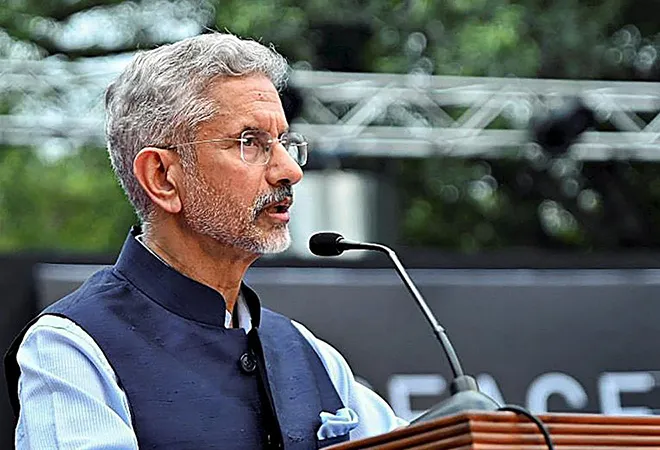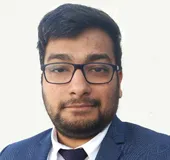-
CENTRES
Progammes & Centres
Location
The regular high-level visits by diplomats to Africa showcase the importance India places on strengthening India-Africa ties

India’s External Affairs Minister Dr. S. Jaishankar recently concluded his two-nation trip to Uganda and Mozambique in an attempt to bolster bilateral economic and defence ties. Uganda, in recent years, has welcomed many high-level visits from India. Prime Minister Narendra Modi visited the country in 2018, during which trip he famously addressed the Ugandan parliament and enunciated India’s overarching policy towards Africa, popularly known as the Kampala Principles. These principles contain elements that are indicative of both the continuity and change in India’s approach towards the continent.
India has also exported many of its “Made in India” self-defence indigenous equipment like fast interceptor boats and armoured vehicles to boost Mozambique’s defence preparedness and military capabilities.
Mozambique, on the other hand, boasts of an extensive Indian Ocean coastline and is of strategic importance to India. After Mauritius, Mozambique is India’s second-largest destination for Foreign Direct Investments (FDI) into Africa, as is evidenced by Indian oil companies having a 30-percent stake in the “Offshore Area 1” project worth US$ 20 billion in the Rovuma gas basin. Maputo is a vital partner for New Delhi to shore up its energy security by importing Liquified Natural Gas and diversifying its import sources. India has also exported many of its “Made in India” self-defence indigenous equipment like fast interceptor boats and armoured vehicles to boost Mozambique’s defence preparedness and military capabilities.
Why this visit matters
Dr Jaishankar’s visit comes at a time when Africa’s other international development partners, such as the United States (US), China, Türkiye, Japan, and the European Union (EU), have conducted their own editions of Africa+1 summits in recent years. Even Russia is slated to hold the second Russia-Africa summit in Saint Petersburg in July 2023. Summit meetings have emerged as critical tools for conducting diplomacy and furthering geopolitical aspirations. Africa’s immense natural resources, demographic dividends, and growing integration through the African Continental Free Trade Area (AfCFTA) have made the continent the ‘go-to’ destination for global powers to compete and sell their own visions for development.
India’s equivalent to these summits, known as the India-Africa Forum Summit (IAFS), was held way back in 2015. Although India’s promise of providing US$ 10 billion as concessional credit, US$ 600 million as grant assistance, and 50,000 scholarships to African students at the last edition of IAFS has already been fulfilled, a prevailing gap of over eight years is far too long.
However, over this period, New Delhi has embarked upon new initiatives like Africa-India Field Training Exercise (AF-INDEX), India-Africa Defence Ministers Conclave (IADMC), India-Mozambique-Tanzania Trilateral Exercise (IMT-TRILAT), organising mini Defence Expos in countries like Tanzania, and showcasing African culture and crafts at Surajkund International Mela. Older initiatives such as the CII-EXIM Bank India-Africa Project Conclave have been conducted regularly, with the 17th edition held in July 2022. Although the COVID-19 pandemic is principally to blame for India’s inability to host the fourth edition of IAFS yet, it is in New Delhi’s interest to do so at the earliest.
Nevertheless, regular high-level interactions such as Dr Jaishankar’s latest visit to Kampala and Maputo are symbolic and help assuage potential concerns and reassure African leaders of the importance that India places on strengthening partnerships with African countries. Continuity is and must remain a central feature of India-Africa engagement.
During Dr Jaishankar’s visit, various new projects were inaugurated, which is symbolic of India’s model of development partnership with Africa—demand-driven, non-conditional, and non-prescription of policies.
Outcomes at Uganda
The inauguration of India’s National Forensic Sciences University (NFSU) in collaboration with Ugandan People’s Defence Force (UPDF) in Jinja province grabbed most of the headlines. This is NFSU’s first foreign campus and will offer courses in forensic sciences, behavioural sciences, cyber security, and digital forensics. The fact that Uganda was chosen as the first destination is a testament to the growing India-Uganda bilateral relationship. The rationale behind the decision to open a NFSU campus in an African country is the high demand for courses in forensic sciences from African students under the Indian government’s various scholarship programmes.
Dr Jaishankar also inaugurated the construction of a solar water pump project, which, upon completion, is expected to provide access to clean water to over half a million Ugandans spread across 20 districts. Getting access to safe, clean, and piped water is a fundamental developmental challenge facing India and Uganda. Therefore, India wants to share its experiences with Uganda in this regard.
Outcomes at Mozambique
In Mozambique, Dr Jaishankar reiterated India’s intention of utilising its G20 presidency to give resonance to the voice of the Global South. He emphasised on the importance of South-South cooperation to collectively shape the global agenda, particularly in areas like debt, health, green growth, digital delivery, and the SDG developmental agenda.
Expanding train networks, waterways connectivity, and electric mobility were discussed with the Mozambican transport minister. Dr Jaishankar took a train ride in a Diesel Electric Motor Unit (DEMU) that has been sourced from India through a US$ 95-million concessional Line of Credit (LOC). Additionally, the Buzi Bridge, constructed by Afcons Infrastructure Ltd. as part of 132-kilometre Tica-Buzi-Nova-Sofala road rehabilitation project, was inaugurated by Dr Jaishankar. This bridge is expected to improve connectivity between Mozambique’s capital, Maputo, and the port city of Beira, and spur socio-economic development and free movement of goods and services. Dr Jaishankar also inspected the facilities of the Fabrica Nacional de Medicamentos (FNM) in Matola, which has entered into a joint venture with the Serum Institute of India for manufacturing vaccines with the transfer of technology.
Going forward
Dr Jaishankar’s visit to Uganda and Mozambique helped put some of the spotlight back on India’s relationship with Africa at a time when global powers are scrambling to carve a niche for themselves in the continent. There is an effective realisation on the part of Africa’s international partners that African stakeholders are pursuing their own strategic autonomy and presenting a coordinated Pan-African strategy. With India currently holding the G20 presidency and pushing for a more inclusive world order, it is an opportune time to induct the African Union (AU) as a permanent member of the G20. South Africa, which represents around 4 percent of the total African population, is presently the sole African member of the G20. By including the AU, the G20 can remedy this unfortunate limitation of leaving out the voices of the remaining 96 percent of Africa’s population.
This would be instrumental in realising Prime Minister Modi’s call for “reformed multilateralism” and for Africa and India to work together for a just, representative, and democratic global order.
The views expressed above belong to the author(s). ORF research and analyses now available on Telegram! Click here to access our curated content — blogs, longforms and interviews.

Abhishek Mishra is an Associate Fellow with the Manohar Parrikar Institute for Defence Studies and Analysis (MP-IDSA). His research focuses on India and China’s engagement ...
Read More +